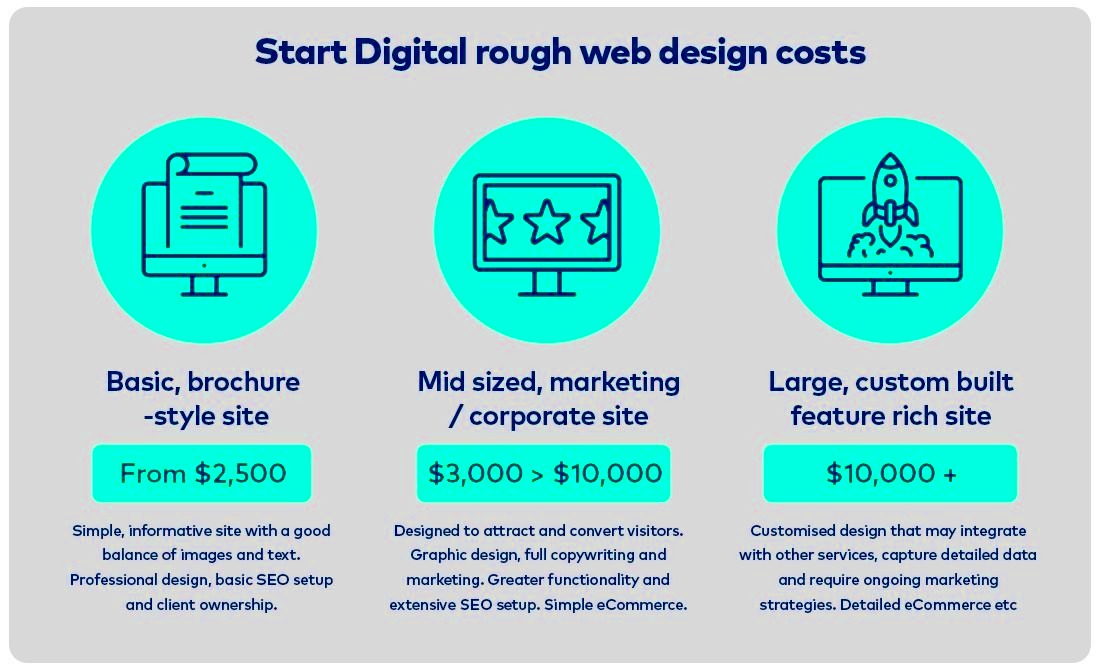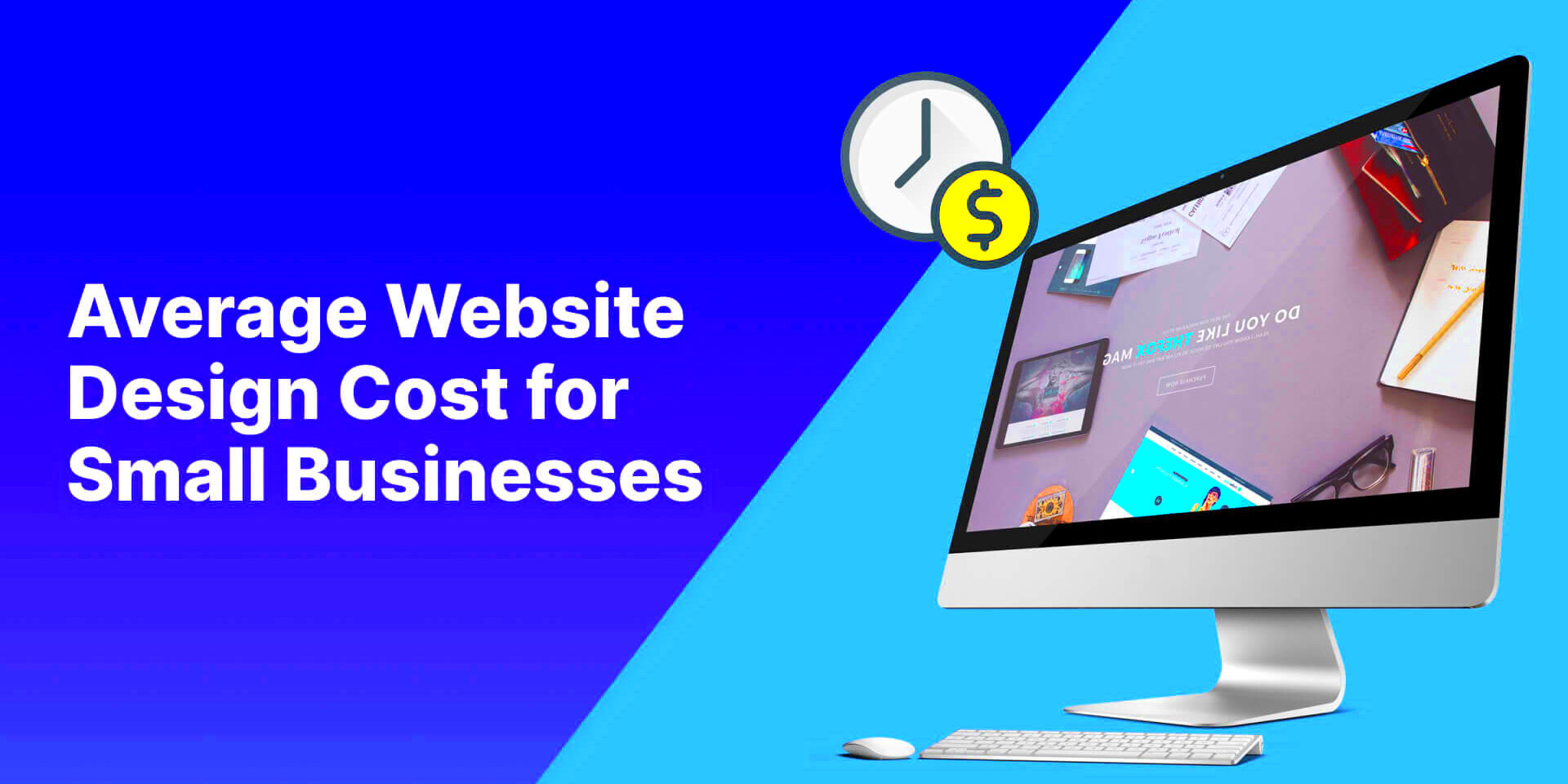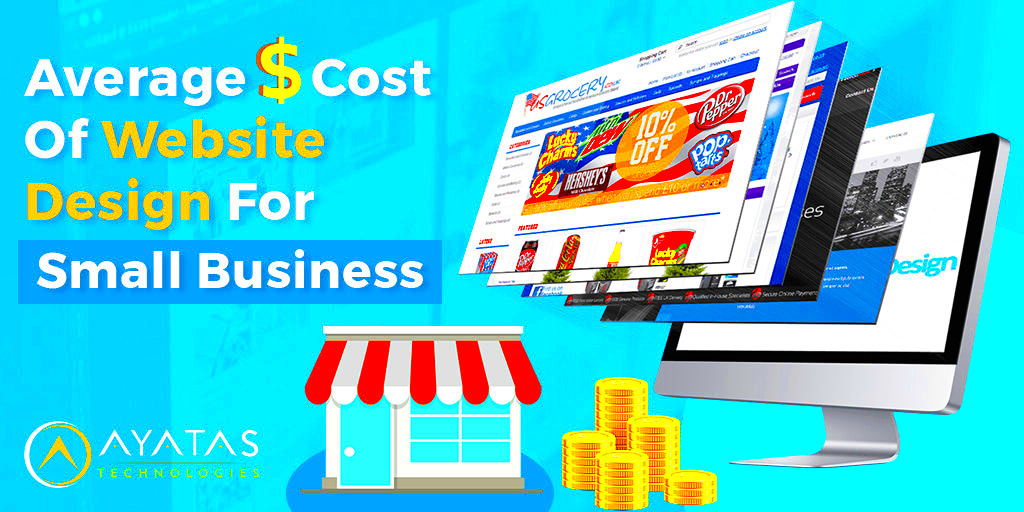When it comes to running a small business, having an engaging and functional website is more important than ever. But how much should you expect to spend on web design? The truth is, the average cost varies significantly based on several factors, including the complexity of the site, the expertise of the designer, and the functional needs of your business. In this guide, we’ll explore what you can anticipate when budgeting for your small business website.
Factors Influencing Website Design Costs

Understanding what drives the cost of website design can help you make informed decisions when hiring a designer or agency. Here are the critical factors that play a significant role in the overall pricing:
- Complexity of Design:
The more intricate the design, the higher the cost. A basic website with standard templates will be cheaper compared to a fully custom site with unique features.
- Number of Pages:
More pages mean more work. A simple five-page site will cost less than a multi-page site with numerous sections and functionalities.
- Functionality:
Do you need an online store, booking system, or membership area? Each additional functionality adds to the project’s complexity and cost.
- Designer Experience:
The experience and reputation of the designer or agency can also affect costs. Established professionals typically charge more due to their expertise.
- Design Trends:
Staying current with design trends might require more effort from designers, which can lead to higher prices.
- Ongoing Maintenance:
Some designers include ongoing support or maintenance in their pricing, while others charge separately. It’s essential to factor this into your overall budget.
Considering these factors can provide a clearer picture of what you might be spending to create a stunning online presence for your small business!
Types of Website Design Services

When it comes to website design, small businesses have a variety of options to choose from. Each type of service comes with its own set of features, flexibilities, and, of course, costs. Let’s break down the most common types of website design services available:
- Freelancer Services: Hiring a freelancer can be a cost-effective solution, especially for small businesses that need basic websites. Freelancers typically charge based on their expertise and the complexity of the project. You can find talented designers on platforms like Upwork, Fiverr, or Freelancer.
- Web Design Agencies: These agencies offer a more comprehensive package that includes a team of designers, developers, and marketers. While they might charge more than freelancers, the benefit is the diversity of skills and dedicated project management. This is ideal for businesses looking to create a robust online presence.
- DIY Website Builders: Tools like Wix, Squarespace, and Shopify allow you to design your own website without requiring any coding skills. They offer templates and drag-and-drop features. This option tends to be the most budget-friendly but may lack the personalized touch an experienced designer can provide.
- Custom Website Design: For businesses with specific needs or those requiring unique features, custom website design is the way to go. This often involves hiring a design agency or an experienced freelancer who can tailor the website exclusively for your brand, but it comes with a higher price tag.
Ultimately, your choice will depend on your budget, business needs, and desired level of complexity for your website.
Average Cost Breakdown
Understanding the average cost of website design for small businesses is crucial for budgeting your project effectively. Here’s a detailed breakdown of the costs you may encounter:
| Service Type | Average Cost | Details |
|---|---|---|
| Freelancer | $500 – $5,000 | Cost varies based on the freelancer’s experience and the complexity of the site. Ideal for simple websites. |
| Web Design Agency | $3,000 – $100,000+ | Agencies offer a full-service option, but they come at a higher price. Perfect for businesses looking for comprehensive services and branding. |
| DIY Website Builders | $0 – $500/year | Low-cost or free platforms with monthly fees for premium features. Best for budget-conscious businesses. |
| Custom Design | $5,000 – $30,000+ | Highly tailored websites for complex requirements, usually with a full project scope and timeline. |
Remember, these are average costs and can vary based on factors such as the complexity of the design, the geographical location of the service provider, and the unique needs of your business. It’s always a good idea to get multiple quotes and thoroughly discuss your requirements before making a decision.
Cost Comparisons for DIY vs. Professional Services
When it comes to website design for small businesses, one of the first decisions to make is whether to go the DIY route or hire a professional service. Each option has its costs, benefits, and drawbacks. Let’s break them down.
DIY Website Design: Choosing to design your website yourself can initially seem like the more budget-friendly option. You can use platforms like WordPress, Wix, or Squarespace, which often offer free or low-cost plans. Here are some cost considerations:
- Platform Fees: Most DIY website builders have subscription fees that range from $0 to $50 a month, depending on features.
- Domain Registration: You’ll need to purchase a domain, which typically costs around $10 to $20 per year.
- Hosting Costs: If you’re using a self-hosted platform like WordPress.org, hosting can range from $3 to $30 a month.
- Design Templates: Premium templates can cost from $30 to $150, depending on the complexity.
- Time Investment: DIY requires time—your time is valuable, and spending hours or even days on design could translate into lost productivity.
Professional Website Design: Hiring a professional can seem like a larger upfront cost, but it comes with numerous benefits that can justify the price tag:
- Cost Range: Prices for professional web design can range from $500 to upwards of $5,000, depending on your requirements.
- Expertise: You’re paying for their skills, which can lead to a more polished and functional website.
- Time Savings: Professionals know how to streamline the process, allowing you to focus on running your business.
- Ongoing Support: Many professionals offer maintenance packages, which can be beneficial in the long run.
In the end, the choice between DIY and professional services comes down to your budget, skill level, and the amount of time you can dedicate to the project.
Hidden Costs to Consider
When budget planning for your website design, it’s crucial to keep an eye out for hidden costs that can sneak up on you. These unexpected expenses can deviate your budget and add stress to your project. Here’s what to watch for:
| Expense Type | Description |
|---|---|
| Domain Renewal Fees | While initial domain registration may seem inexpensive, renewal fees can catch you off guard every year. |
| Premium Plugins and Themes | Many DIY platforms offer free options, but premium features often come with additional charges—sometimes hundreds of dollars. |
| SEO and Marketing Costs | Investing in search engine optimization (SEO) and online marketing will be vital for driving traffic to your site, adding to your overall expenditure. |
| Website Maintenance | If you’re not tech-savvy, maintaining your website may require the help of a professional, leading to additional costs. |
| Content Creation | If you lack the time or expertise to create content, hiring a copywriter or photographer will add to your budget. |
Taking the time to identify these hidden costs upfront can help you create a more accurate budget for your website design. Always remember: a well-planned budget often saves you from unexpected hiccups down the road!
Choosing the Right Designer or Agency
When it comes to designing a website for your small business, selecting the right designer or agency is crucial. This decision can significantly impact not only the aesthetics of your site but also its functionality and user experience. Here are some factors to consider when making this important choice:
- Experience and Expertise: Look for designers or agencies with a proven track record in your industry. Their familiarity with the nuances of your market can lead to better design choices.
- Portfolio: Review their past work to see if their style aligns with your vision. A strong portfolio not only showcases creativity but also reflects the designer’s capabilities.
- Client Testimonials: Read reviews from previous clients. This can give you insight into their reliability, communication skills, and overall satisfaction.
- Services Offered: Ensure the designer or agency provides a comprehensive range of services, from initial design to SEO and ongoing support. This can save you time and money in the long run.
- Budget: Be upfront about your budget. A good designer will work within your constraints while still delivering quality work.
In the end, trust your instincts. A strong working relationship with your designer or agency can make the development process smoother and more enjoyable. Ask questions, be clear about your goals, and don’t hesitate to seek referrals to ensure you find the best fit for your needs.
Budgeting for Future Updates and Maintenance
Designing a website is just the start of your online journey. To keep your site running smoothly, it’s important to budget for future updates and maintenance. Here’s what you need to consider:
- Regular Updates: Websites require frequent updates to stay relevant. This includes adding new content, updating plugins, and ensuring security measures are current. Set aside a portion of your budget for these regular tasks.
- Content Management: If you plan to regularly post blogs or change product offerings, consider a content management system (CMS) that simplifies updates. Make sure to budget for any training or technical support you might need to effectively use the CMS.
- Technical Support: Even if your site is expertly designed, technical issues can arise. Having a reliable tech support plan can save you from headaches down the line.
- SEO Maintenance: To keep your site visible in search engines, you’ll need to invest in ongoing SEO strategies, such as keyword changes, backlinks, and analytics review.
Incorporating these elements into your budget can ensure your website remains dynamic and effective. By planning for the long-term costs associated with updates and maintenance, you can maintain a strong online presence without unexpected financial strain.
Conclusion
When considering the average cost of website design for small businesses, it becomes clear that various factors influence the final expense. On average, small business owners should expect to pay anywhere from $2,000 to $10,000 for a professional website, depending on their specific needs and the complexity of the project. Here’s a brief overview of the key elements that can affect the cost:
- Type of Website: E-commerce sites usually command higher costs compared to simple informational sites.
- Design Complexity: Custom designs are more expensive than templated solutions.
- Functionality Required: Features such as contact forms, booking systems, and membership areas can increase costs.
- SEO Services: Investing in search engine optimization may add to upfront costs but is crucial for long-term success.
- Maintenance and Updates: Ongoing support and regular updates can impact the overall budget significantly.
| Website Type | Cost Range |
|---|---|
| Informational Website | $2,000 – $5,000 |
| E-commerce Website | $5,000 – $10,000+ |
| Custom Website Design | $10,000 – $25,000+ |
In summary, understanding these variables can help small business owners make informed decisions about their website design budgets, ensuring that they invest wisely in their online presence.



